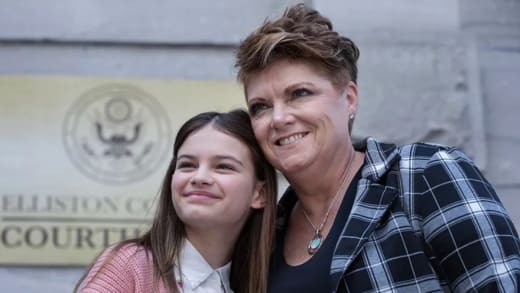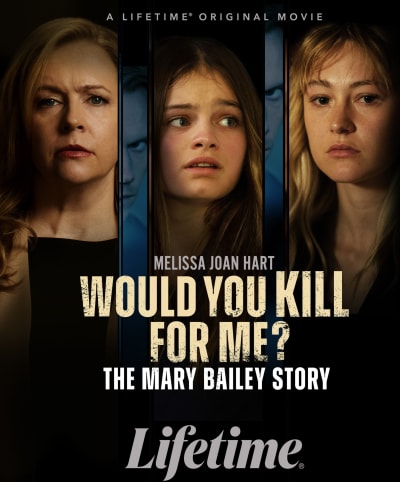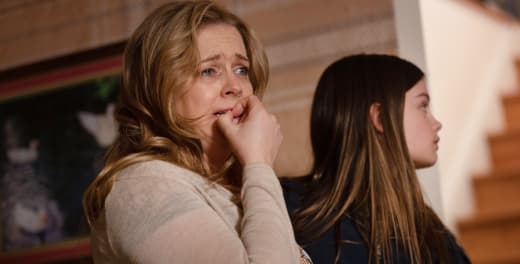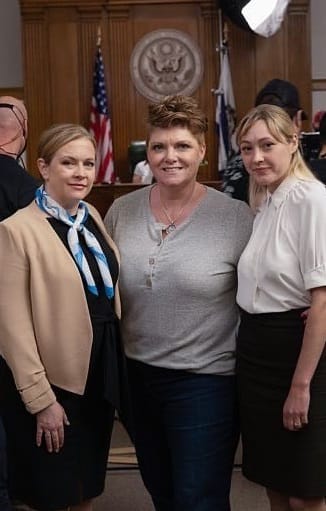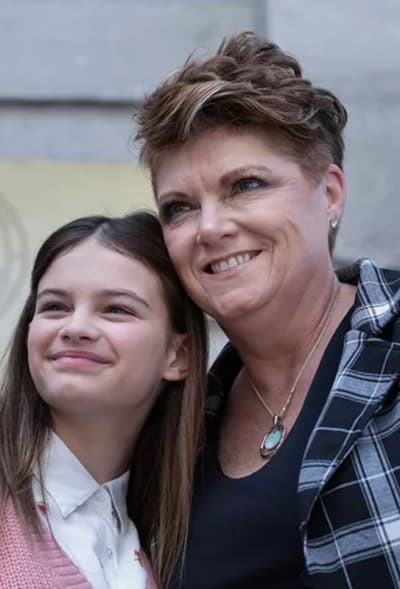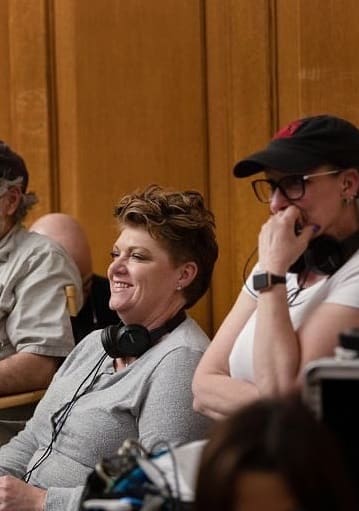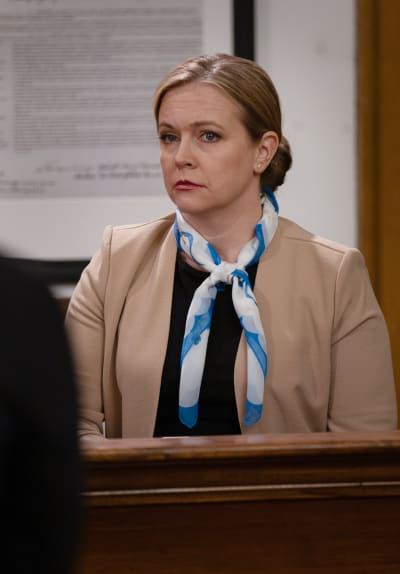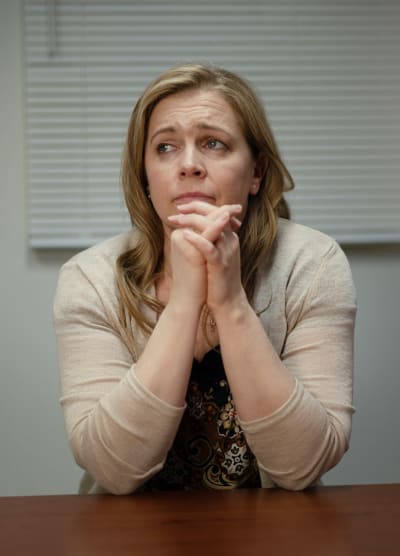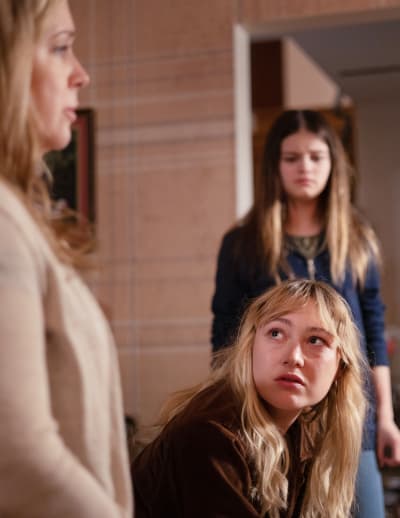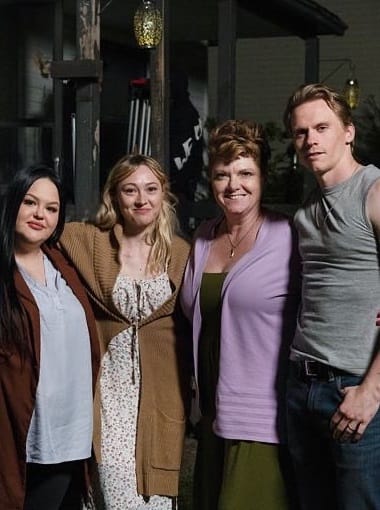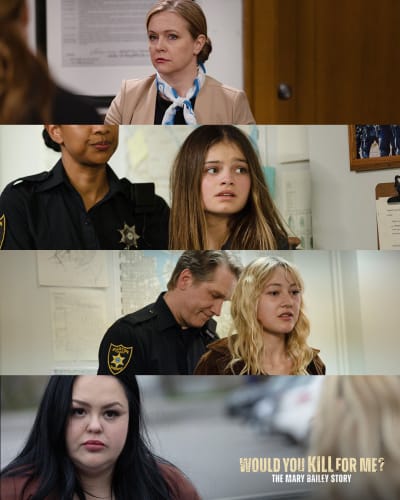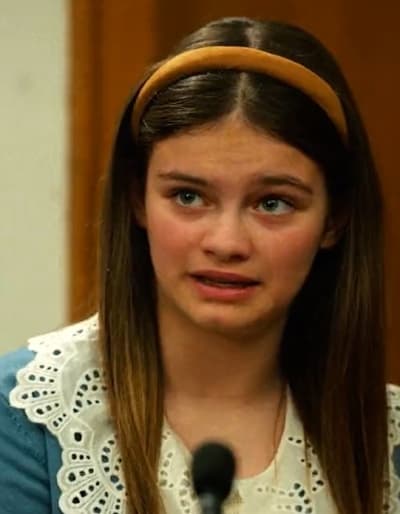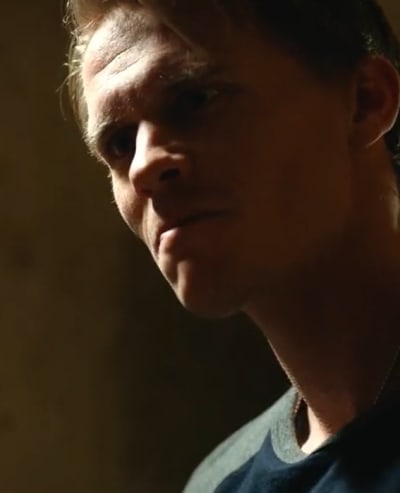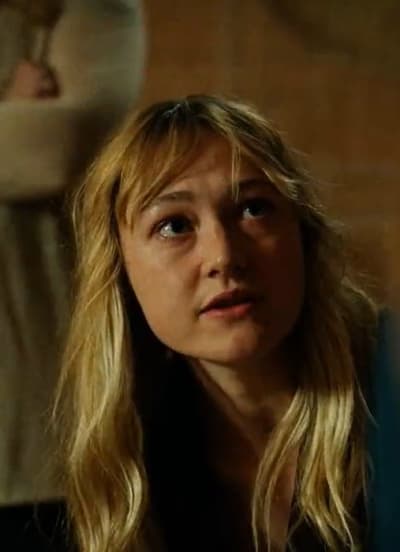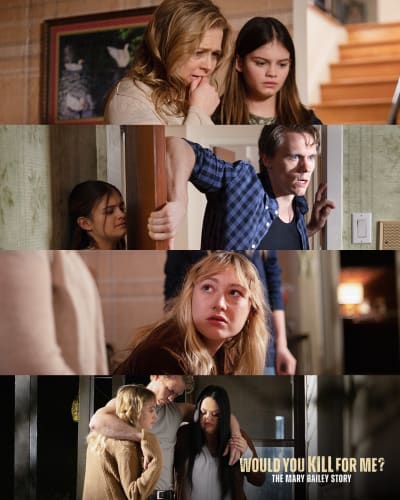Mary Elizabeth Bailey is a true inspiration.
She’s also the inspiration behind Lifetime’s latest Ripped from the Headlines film, Would You Kill For Me? The Mary Bailey Story.
It’s a difficult-to-watch but fantastic movie and one of the strongest of the true-crime slate.
We were incredibly fortunate to speak to Mary Elizabeth Bailey about bringing her story to the small screen, advocacy, healing, what she hopes others pull from her story, and so much more.
Check out our discussion below, share your thoughts, and show her love in the comments.
Did Lifetime reach out to you about wanting to do your story? What inspired you to join forces at Lifetime?
Yeah, after I had written the book, People magazine reached out to me, and I did the People magazine article last year.
After that came out, Pierre David, a producer who works closely with Lifetime for most of his films, reached out to me through one of his assistants on Instagram. I followed up with Jackie on the request to see if it was legit, let her do her magic, and here we are. We ended up with a movie.
Yeah, you did. Not everyone gets one!
It’s incredible. It’s truly a blessing. I’m so thankful and grateful that we’re able to get my story to the public, for people to read it and to see it, and hopefully, it will help many people. That’s my goal.
Sometimes, in films like these, liberties are taken for the fictionalized drama aspects. How much did the film differ from your actual experiences?
There are definitely some different scenarios. For instance, they have in the movie that my grandmother was up during the murder, and in fact, she was in bed asleep. She had nothing to do with it. So it’s just things like that.
It’s just my brother and myself in the movie. But I have two other siblings who were there and in the book, My Mother’s Soldier, but just because of cost restrictions and certain things.
There were a few liberties taken that they had to take when I was a baby or things that happened between my mother and some other folks, Willard’s ex; I wasn’t old enough to know what happened.
So they had to take liberties in that respect. So it’s good. It’s fine. Everything was done very tastefully and respectively.
Now, was that you making an appearance during one of the courtroom scenes?
Yes.
I love that. I thought it was poignant to have you sitting behind this young actress playing yourself. What was that moment specifically like for you?
Because you’re part of this project, telling your story and seeing it all play out in front of your eyes. Can you describe what that was like for you on set and that feeling?
It was an incredible moment. And just to capture that and capture that scene the way we did it really was incredible. And to just look and watch your life unfold.
Because I wasn’t in the courtroom as a child when all that was taking place, I didn’t get to experience what was said. Just the courtroom drama, you would say. I didn’t experience it.
So, to be able to sit there as an adult in the courtroom and look and watch is incredible. I don’t think many people get to watch their lives unfold in that respect.
So that was interesting, and it was very emotional. But it was just such an honor and a privilege to be there and to have that part and just to be sitting right behind Presley [Allard], who’s playing me. It was just incredible.
Oh, she was fantastic. She was so good.
Wasn’t she great? I told her, “Presley, you’re going to be amazing if you continue to act. You have this uncanny ability just to grab audiences and grab people. She’s just so good.
I appreciate and found the movie filming from three different perspectives interesting. I think that was one of the film’s strengths, with a lot of emphasis on the generational trauma and sort of that cycle and just leading to you breaking that cycle.
So, was it difficult to revisit that in that aspect, or did you consider this film cathartic?
It really was cathartic. But writing it was probably the most cathartic because that’s when all the real emotion in me watching the film, watching the tape, seeing what my mother said in the courtroom, seeing what happened in that courtroom.
But it was, and it was interesting to see it from different perspectives because when I first started watching the film, I wasn’t there the entire time for the film.
I was there for the last seven days, so I saw a lot. So when I’m watching it, I’m like, Wait a minute, that’s not what happened. But it took me a minute, even me, just a minute, to realize that this was coming from someone else’s perspective. And that’s what audiences have to realize.
There are three perspectives of a story. Even myself, when I began watching it, sent me the link. I was taken aback at first and like, Wait a minute, that’s not what happened.
But from her perspective, it was exactly what she said. But I wasn’t in the courtroom. I don’t remember all the things that she said, and I wouldn’t be privy to all that until I wrote the book.
Of course, it’s like the saying goes: it’s your truth, my truth, and the truth somewhere in between when they talk about perspectives.
I enjoyed that aspect of the film and the multigenerational component of it, with each of these women bringing their own experiences and traumas into the mix. It was so quintessential Lifetime. They’re just really great at telling, like they say, real stories about real women.
I agree. I could not agree more.
And when you hear that part in the movie, they say, we don’t want to hear your grandmother’s story, Mary, your mother’s story. We want to hear your story, and I thought that is exactly right. That is the story. That’s the truth. That’s what you’re going to hear. They did a fantastic job with that.
I can’t say enough good things about Greg McBride. We are like kindred spirits.
As he wrote it, we could communicate and talk through Zoom. And he’s just been such a blessing in my life. He’s just so compassionate and so understanding, and he’s so fun to work with.
There’s a lot of emphasis on your strength. Going through something like that and persevering, I’m in awe of you, and you’re an inspiration because of your strength and resilience.
But it was fascinating that your strength was almost a double-edged sword. It was used against you as well — as far as your mother relying on that strength that she maybe didn’t possess to save her.
Yeah, that’s a really good point. You’re really the first person who’s probably pointed that out and said that.
But you’re right. She relied on me at eleven years old to save, protect, and help her. And then ten years later, the same thing happened. She’s looking at me at the end of the movie to help her, to save her, and really her whole life. That’s just how she was.
It was always me that had to be the strong one, me that had to be the one to take care of kids and her, and it was tough.
Yeah, it’s been a crazy ride, but I learned so much, and I’ve learned how to heal, and I’ve learned how to have hope and forgiveness and all those really wonderful things that we all strive so hard to learn in life.
It wasn’t easy, but it’s been worth it. And in the process, I’ve healed so much. And it’s that’s the great part of it.
That’s what I want for everyone who watches this film to see and pull those positive things and those things out of the movie so that they can use them in their life and try to process their traumas.
Absolutely. I’m in awe of that healing process. How do you get on the other side of that? The timing of this film couldn’t be better with Domestic Violence Awareness Month.
And Breast Cancer Awareness Month. I’ve had breast cancer. I’m a cancer survivor. And yeah, the timing for everything. Today’s my birthday, so today’s another great day.
But everything leading up to this, there’s purpose for this, and finding all that strength to do those things, it was through my faith. That’s what I had to have. At the end of the day, I had my faith, and that’s what pushed me through.
And I know that not everyone has that. And I’m not someone who’s super religious or anything like that. I have faith, and I have the belief that you can overcome things, that life doesn’t have to be how it was when I was 11.
I don’t have to live that life. I can break that cycle. I can move on because it’s my life. I can’t blame my parents forever.
It appeared that church became your sanctuary. Was your grandmother the one who brought you to church as a child?
She would take me to church, but in the book, I talk about the pastor who picked me up. He started picking me up every Sunday and taking me to church, and he invited us to vacation Bible school.
I was out playing one day, and he invited us, came up, just drove up, and was like, “Hey, kids, you guys want to go to vacation bible school?” And I was like, “What’s that?” And he’s like, “Church. We sing, and we eat cookies, and we play, and we just have a great time.” Like, yeah, I want to go.
So that’s just where I found a purpose. I found people there, and I found purpose, and I found God. I found somebody I could talk to. And to me, that was what I needed. I needed someone I knew who would listen to me, even though I didn’t know who he was.
He wasn’t somebody that I could just call up on the phone or go down the street to their house, but it was somebody that I knew, and I felt like was there.
And so for me, when I went through the trauma and, after the murder, went into foster care and wasn’t allowed to go back to school, I was sitting at home by myself.
I was sitting in a stranger’s house, essentially. These foster people, I don’t even know these people. So, that relationship that I had built and that faith that I had was my comfort.
That’s what helped me every day to get through it.
And so you go through life, make mistakes, live, and do, but that faith has always been there. And it’s always helped to remind me to forgive, help, and give hope where hope is lacking.
This happened in the 80s. Domestic violence wasn’t taken seriously enough at the time. It still isn’t today, even though we’ve made progress. But still, there’s such a lack of comprehension about the many forms of abuse and what it even looks like.
How important was it to truly capture the layers of domestic violence and abuse? You guys did it well, I’ll add.
Yeah. I was glad to see that. I, of course, wish Lifetime — we could have done a little bit more because there was a lot of abuse, a lot more than you saw. And it was a little more graphic and a little more violent. But I’m glad through the domestic violence that they can see that.
As you said, it was not a big thing in the ’80s. Battered women’s syndrome was just starting to be something you heard about or discussed. But I see it even today.
My husband is a lawyer in family law, and he deals with these things: domestic violence, domestic issues, people filing 50B’s on their spouse, whether they’ve abused them or not.
The system is just broken.
But it is getting better, and I think just constant awareness and bringing films, books, and movies out here so that people can see it and hopefully look at that and say, oh my gosh, I’m in the same situation. I have to get out. I have to look at other options. I can’t let what happened to this little girl happen to me because it can happen to anyone.
Of course.
Recognize these signs and get out. It seems horrific, like, who could do this? But when you get desperate, Greg did a good job of showing my mother’s desperation.
Yes, it is a very complicated situation with so many complexities, and the film captures the layers. One of the first questions is, “Why didn’t you just leave?” And we see a bit of why it’s not so black and white, especially during that time.
And she did leave, and in my book, she did leave, but his threats were just too much for her.
Of course, I wrote about that because he would leave, and we’d go back to my grandmothers, and we’d stay there, and he’d call her on the phone and say, “I’m standing right here at the top of the mountain, and when you come out the door, I’ll just blow your head off if you don’t come back home.”
‘So you either need to come back home today, or I’m going to blow your brains out.” And it was just that simple.
What do you do? You’re 20-some years old; you’re scared of this person.
He’s violent; he’s proven that, so it’s just easier to go back.
Do you want to share any final thoughts about Would You Kill For Me, its importance, and why people need to see it?
So many people know who I am today. I’m happy. I’m successful by normal standards, and I’ve not allowed this to shake me and to change me.
I’ve continued to focus on myself and who I want to be, and I want other people to see that. I want other people to watch this and think, you know what? I’m not going to let my current situation or what happened to me in the past stop me from being the best version of myself and who I can be.
And if there’s someone they need to forgive in their life, I hope they can find a way to open up, to write a letter, to pick up the phone and call that person before it’s too late.
I got the chance to really revisit my mother after 20-some years of not seeing her, all because of my book, because of People magazine, and the film.
I mean, she passed away less than a year, less than six months after I saw her. When I did the People magazine, she passed away from cancer.
Had that not happened, had I not been brave enough to write the book and to talk about things that were hard to talk about hard things, I would have never been able to reconnect with her, and she would have died thinking I didn’t care, I didn’t love her, I didn’t forgive her. But that didn’t happen.
And so that’s the blessing in it all. Again, it feels like that’s exactly where God was leading me down that road to forgiveness. And I just think it’s wonderful.
So that’s what I’m hoping for with the film, is that people can look in themselves and see if they can see themselves anywhere in this film, anywhere in this life. That’s my hope.
For more information about the inspiring Mary Elizabeth Bailey, you can check out her website, and you can also find her on Instagram @mymotherssoldier.
If you or someone you know is in need of assistance, you can find anonymous, confidential help available 24/7, call the National Domestic Violence Hotline at 1-800-799-7233 (SAFE) or 1-800-787-3224 (TTY). You can also text START to 88788.
Would You Kill For Me? The Mary Bailey Story airs Saturday, October 28 at 8/7c on Lifetime.
Jasmine Blu is a senior staff writer for TV Fanatic. She is an insomniac who spends late nights and early mornings binge-watching way too many shows and binge-drinking way too much tea. Her eclectic taste makes her an unpredictable viewer with an appreciation for complex characters, diverse representation, dynamic duos, compelling stories, and guilty pleasures. You’ll definitely find her obsessively live-tweeting, waxing poetic, and chatting up fellow Fanatics and readers. Follow her on X.
